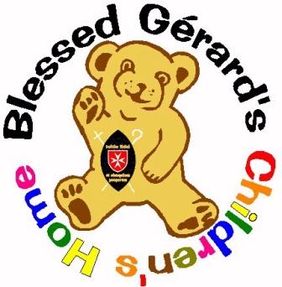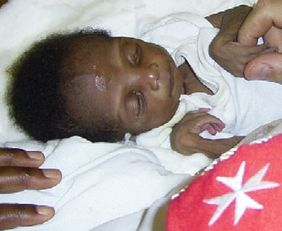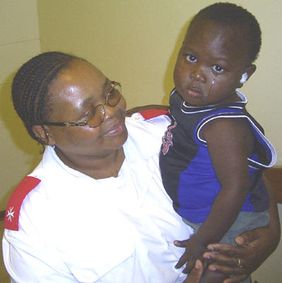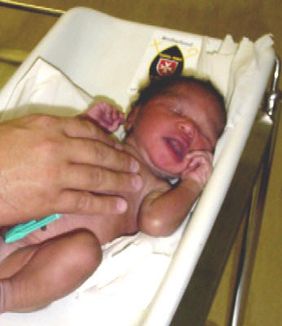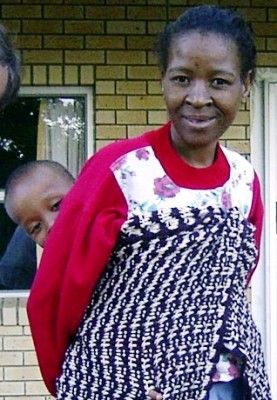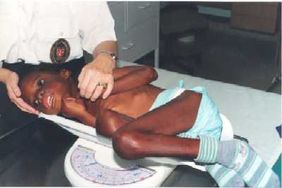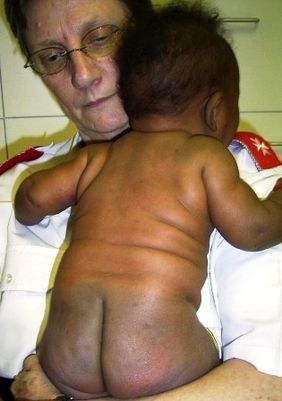A programme by Gaby Kuhn with Father Gerhard Lagleder OSB.Recorded on 7 December 2010Sent on 8 December 2010: 4:30 p.m.
Good day, dear listeners! Welcome to Radio Gloria. My name is Gaby Kuhn and I am pleased to accompany you through the programme. Today's topic is "Looking for a home in Zululand. This is a home for children who have no home." Our guest of the day today, whom I am pleased to welcome, is Father Gerhard Lagleder. But because Father Gerhard does not understand Swiss German, I will continue in written German from now on. Before I hand over the floor to our speaker, I will briefly introduce him and his project: As I said, our guest today is Father Gerhard Lagleder from South Africa. He was born in Regensburg in 1955, where he also received his priestly ordination in 1982. In the same year he joined the Order of Missionary Benedictines in St. Ottilien. In 1994, Father Lagleder became Magisterial Chaplain of the Sovereign Military Order of Malta. In 1992, Father Gerhard founded the Brotherhood of Blessed Gerhard in Zululand on the east coast of South Africa. It is an independent relief organisation within the Order of Malta. Father Gerhard runs a home for children without a home there. At this point I will give the floor to Father Gerhard so that he can tell us more about his work. Greetings, Father Gerhard, and welcome to Radio Gloria!
Goodbye! This is Father Gerhard again from Zululand in South Africa. I have already been your guest twice on the radio and I am very happy that I can chat with you again today and tell you something, today about our children's home which we run and look after in Mandeni.
Father Gerhard, how does a Regensburg resident end up in a missionary order and finally in South Africa?
This is a very long story, which, to tell it very briefly: I went to the University of Regensburg, studied theology there, and was then ordained a diocesan priest. But in the last few years before my ordination to the priesthood, the thought awoke in me very intensely that a real, quite radical and uncompromising following of Christ could actually mean religious life for me. And then I made enquiries. And I had a lot of friends who were religious, and then I came more and more to the conclusion that religious life was actually my true vocation, because I thought that it was precisely in this way that I could serve the Lord and His Church in the most uncompromising way, and so about a year before my ordination to the priesthood I decided to join the Missionary Benedictines in St. Ottilien. The Archabbot at that time, who is the current Abbot Primate of the Benedictine Order, Notker Wolf, told me at that time: "If you feel called to the priesthood, then first finish and be ordained as a priest, because we cannot appoint you as a priest in the monastery if you have not yet been ordained. And if you feel the vocation, then first take your step, or go to the end of your vocation path." And then I was ordained a priest in Regensburg on 28 June 1982, and on the day of my ordination I was given leave to enter the Order, and then I entered the Missionary Benedictines in St. Ottilien, and then I did my year of novitiate, my three years of temporal process, and then, after my solemn profession, three months later, I was on a plane to South Africa. I was sent out as a missionary to Zululand on 6 January 1987 by the then Archabbot Notker Wolf, and I have been working here in South Africa since that time, which is now almost 24 years.
Father Gerhard, can you describe to our listeners where Zululand is and how one should imagine it?
(If you) fold the map (of South Africa) exactly in the middle and then go east at the centre fold, you will find Durban, a huge city of 4 million on the Indian Ocean. And if you go 100 km north from this Durban, you come to the Tugela River, to the mouth of the Tugela River into the Indian Ocean. And if you go 10 km inland from there, then you are exactly in Mandeni, where I was sent. I was originally assigned to Inkamana Abbey, the Benedictine Inkamana Abbey in Zululand in South Africa, and they sent me to the area where I am now over 20 years ago. And there I was first a parish chaplain, but then I saw my very special vocation in parish charity work, because I came to an area where there was so much need. And the Church has three essential tasks - everyone knows that, you learn it in catechism classes - to celebrate worship, to proclaim the faith and to put God's love into practice in charity, in Caritas, and that's exactly what I did. And so, for me, charitable work was one of my main focuses, because I was in a parish where a large part of the people do not have enough to live on, where there is crying poverty, where there is an infinite amount of illness and a lot of need. And the Church has to do something about that. And so I thought to myself that we as the Church must try to organise the relief work properly, and that is why I founded a relief organisation which we called the "Brotherhood of Blessed Gerard" after the founder of the Order of Malta, Blessed Gerard. And this has now become the largest Catholic relief organisation in South Africa. And I am very grateful that we have so much support and so many people who are willing to help the poor and the sick. And this is exactly what we are doing in Mandeni in Zululand.
As I said, you have an orphanage in Zululand for children who have no home, or no parents. What does your work there look like, Father Gerhard?
Yes, I can tell you a lot about it, because I really put my heart and soul into it. I think I should first tell you how it came about that we started this children's home. It simply came about because we first started a hospice. And in this hospice we cared for dying people, and we still do. And it happens very often that a mother comes to the hospice with her child, the mother then dies - unfortunately most of them die of AIDS - and then the children are left. Normally, in Zulu society, when a mother dies, the family would take over the children, but the big problem is that so many of the family members have also died of AIDS. Last week I told you that three quarters of the population are HIV-positive. And with this infestation, there are simply not enough people left. And that leaves a lot of children. And so we simply took in children, so-called AIDS orphans. But that is not enough. We also received many other children as soon as they heard that we had opened a children's home, and this was more than ten years ago. And there we also got many abandoned children. We got neglected children. Unfortunately, we also have many abused and mistreated children. We have sick children with us, and among these sick children are also children with AIDS. We also have disabled children, physically and mentally disabled children. And of course, we have orphans with us, where both parents have died, and we take care of them.
I would like to tell you a true Christmas story: On 21 December 2003, a little boy, maybe three days old, was brought to us and after being found as an abandoned child. He was obviously premature and very weak. He was severely dehydrated and malnourished. He had mouth rot, which is usually a sign of immune deficiency. He had hardly any strength to suck on his own baby bottle, and vomited immediately after feeding. He had severe diarrhoea and we had every reason to try everything to save his life. I was then so scared for him that I gave him the emergency baptism the same evening he was brought in. I baptised him in mortal danger. We got him through and he didn't die. He got new strength and - which was a strange thing with him - he had completely crippled hands, his hands were turned 180°, as if folded in, like a folding spade downwards, lying on the forearm, and we had to straighten these arms in months of physiotherapy. And now he is not only a well grown guy, but he is cheerful and happy. How did this happen in the first place? I would like to tell you that story too: We later found out that he was not actually an abandoned child, but that there was a grandmother who was supposed to take care of him, because the little boy's mother had not made any appearance at all. We had no idea then, and still have no idea today, whether she is alive or no longer alive. And the little boy's grandmother must have been so frustrated with the fact that she had to take care of him that she literally threw him away, into the arms of the man who brought him to us. Presumably the man is the father of the child, but he never admitted it. So the grandmother took the child and threw it to him from a distance of 2-3 metres. And so he came to us, and we took him in with all our love and all our care. And today he is a strong, healthy, cheeky boy who is full of life and vigorous. And so we are very happy that we were not only able to save his life, but that he is now a joyful and happy boy. That was this story, this true Christmas story that I wanted to tell you.
(musical interlude)
There are many more children with very bad fates.
I think I would like to read you one of the worst fates, because we once wrote a story about his life, about his background. We wrote a story about his life, about his past history, and we let (him) speak, i.e. we let his mother speak in this story. And I would like to tell this story now: The boy's mother, we called him Sduduzo, this is not his real name, but we just call him that in the story now. And the mother, we have given her the name Mpume, which is also an invented name. So the mother speaks: My name is Mpume, and in July 2000, like everyone else, I was happy and full of confidence about the future. I was 29 years old and the world was my oyster. I had moved from Mandeni to Durban to look for work. There I went to a party with some of my new friends and there I met the man, and then I found out I was pregnant, but his father never took the time to care for him. On the contrary, he dumped me when he heard I was pregnant by him. He accused me of lying and that the child could be by another man. I cried, but decided to take my life into my own hands as best I could. My dear little Sduduzo was healthy and grew splendidly. But I felt increasingly run down and had to cough all the time. In the meantime, I met another man who was like a good father to my son. Sduduzo and I moved in with him. He was so good to us, and helped us cope with our problems. I got progressively worse, and then I found out that I was pregnant again. Buyi, my partner, took care of all of us. I am convinced that he really loved my son and me. During the course of my pregnancy, I went regularly to the local clinic for check-ups. I was just 30 years old, in the fullness of my life. That's when I was struck by lightning. A catastrophe! The nurse at the clinic had taken my blood. She offered me a stool, and then told me that I was HIV positive, that my CD4 count was very low, and that I was suffering from stage 3 AIDS, and had pulmonary tuberculosis. I was devastated. What am I going to do now? What will happen to Sduduzo? What will happen to the baby in my womb? Will the clinic give me antiretroviral drugs? How long do I have to live? Is Buyi also HIV positive? Questions upon questions ran through my mind. My world collapsed. The nurses at the clinic gave me TB medicine. It made me vomit. They gave me multivitamins and iron tablets, but they didn't really help either. They gave me painkillers and something for diarrhoea. I kept losing weight even though I was pregnant. (Buyi and) my son was born in August 2003. I was so weak that we couldn't get to the hospital in time. The baby was born at home, but he was also very sick and did not survive. Now I had to bury my little baby. Now it had become too much for Buyi with my two-year-old son and me. We moved to my mother's house where she lived with my brother. One night he came home late. He had got drunk and was terribly upset. My mother argued with him because he was drunk. He grabbed a knife and stabbed her right in front of us. I was far too weak to do anything. Sduduzo ran to mum who was lying on the ground. He yelled, "Grandma! Grandma!" But it was too late. She was already dead. My brother kicked Sduduzo with his feet. His heavy boot smashed on Sduzo's head. He flew through the air and fell to the ground unconscious. He had a fractured skull and a ruptured eardrum. He kept asking me why all this had to happen to us. I have never harmed anyone. That's when Buyi came. He said I had better go back to Mandeni where my sister lives. Now I arrived at Zama's kraal where she lived with her unemployed husband and three children. Zama saw at first sight that she was not able to take care of Sduduzo and me. She didn't have a clue how to deal with someone with severe AIDS, how to care for them, and she didn't even have money to feed her own children. I knew I was asking too much of her and her husband. Still, Zama did not abandon us. She took us to Blessed Gerard's hospice. Sduduzo was still scared and in terrible pain when we were admitted. The nurses took in Sduduzo and me and cared for both of us. So I could still be with my hearty Sduduzo until God called me to Himself three days later. Now I am reunited with my mother and my tiny baby. Sduduzo is now being lovingly cared for at Blessed Gérard's Children's Home. His ear has stopped festering. He has many friends and he is laughing again. Now I am happy and I like to look down at him because he has a secure future in the hands of people who really care about him and others.
Dear listeners of Radio Gloria who have joined us later, we are listening to the programme entitled "Hostel Search in Zululand. The home for children without parents or without a home". Our guest is Father Gerhard Lagleder.
And now I would like to tell you another story. We have a total of 43 children at the moment. And of these 43 children, every single one has a mostly very terrible story of suffering behind them. We are not a boarding school where children are accommodated and then go home to their families at the weekend, but we are their home. We are the home for children who simply have no one else to look after them.
Now I would like to tell you a somewhat funnier story about a child who is also with us, and who is now also as happy as a lark. And how did he come to us? They were young Zulu men and they played football together. That's what the Zulus like to do. And when one of them kicked the ball far over the field, he ran after it into the bushes. And while he was looking for the ball, he suddenly heard a small child whimpering. He followed the sound and found a small child covered in ants, screaming, with the umbilical cord and the afterbirth still attached to the child. Now, of course, this young football player didn't know what to do with such a child. But, thank God, he picked up the child, including the afterbirth, and took it to the police. The police were also at a loss. They then took the child to the local clinic. There, the child was taken and washed and then the clinic said: "Yes, we don't know what to do with the child either. And then they called us. And that was several years ago now and that's how, let's call him Sibusiso, that's how Sibusiso came to us. And the nice thing about such children is that they can't remember at all what bad experiences they have gone through, and that they come to us like a clean slate and can practically grow up with us, really like in a real home. We have several more abandoned children. Another trick is that we have two who came to us in the same way. The one that came recently, the story was that a young woman was standing at a bus stop, and then all of a sudden another woman came up to her and said, "Yes, be so kind and hold my child for me. I have to go to the toilet quickly and I don't want to take my baby there. It's so dirty there. And when I'm done with the middle toilet, then I'll come and take him again." And she left and never came back. And since then the little one has been with us, and that was only a couple of weeks ago, so he's only a couple of weeks old. So he came to us 2-3 weeks old. So this kind of child abandonment happens with us all the time, and so we have some of these children. But, as I said, at least nothing bad has happened to these children, and so they can be well looked after.
A worse case is the case of the Bhekithemba, which I will also briefly tell you about. The following happened to Bhekithemba: He lived with his mother with relatives. And a big problem in our country is that many young women get pregnant even though they don't want to. About 95% of children are born outside of marriage and a child is an undesirable side effect of earning money. And so many children are not really loved at all. But in this case it was different. The child was loved, but not by the family. The relatives where the mother and the child stayed found out that the mother and the child had AIDS, and they locked the child and the mother out completely, literally, in a small hut outside the family kraal, and locked the door in this hut and, without having water in it, without having a toilet in it, and they then pushed the food through a gap under the door in a bowl, and pushed the water through there. So they really treated them - I don't know what to say - it's worse than how lepers were treated at the time of Jesus, and they were so completely outcast, because everyone was so afraid of AIDS. And thank God the neighbours became aware of what was going on there and then called the social workers. And the social workers then brought this child and the mother to us. The mother died of AIDS in our hospice, and the boy is still with us today. He is also being treated for AIDS, so he is doing wonderfully now. He is happy as a lark and he feels healthy and strong, and we are very happy that at least he can have a good future.
Now I would like to tell you another story, which is actually also very bad: I was called: "Father, please come! There is a little child. He is about nine years old." I drove there, I couldn't drive to the hut because it was very rough terrain, then I walked for about an hour through the bush with the people and climbed up the mountain where the hut was. And that's when I saw the little boy. And he weighed twelve kilos at nine years old! He was so extremely malnourished. We took him away straight away. He was really like a skeleton covered with skin. And I took him with me, and even though I had to walk for an hour through the bush, he didn't weigh anything, so it wasn't even difficult to carry him, and then I brought him to our Care Centre, and there he was examined. And we found out that the mother was HIV-positive. We later did an AIDS test on him and he was not HIV positive, thank God. But what happened, what we found out later, from the grandmother, is that he had a cerebral infarction at birth and from there he suffered severe epilepsy. And this severe epilepsy had of course remained untreated for years. This resulted in severe brain damage, which is unfortunately irreversible. And so he came to us at the beginning. He did not react at all. He didn't respond to laughter, to being touched, to anything. If you moved your hand back and forth in front of his face, he didn't make a face, and then he didn't blink his eyes. So he was completely apathetic. And it took ages until we even got him to the point where he accepted something to drink and eat. And then it took a very long time until he recovered and became strong. And it's been several years now that he's been with us. And now he is strong. Now he walks around. Now he is happy. Now you can laugh. Now he can cry. Now he can play with the other children. But of course, unfortunately, he is severely mentally handicapped and also physically handicapped. He has paralysis symptoms, but despite his paralysis symptoms he can walk around. And in the meantime he has turned 18, and that is how long he has been with us, and so we are very happy that we could not only save his life, but also give him the best possible quality of life.
So there are a lot of children who come to us with very different conditions.
I would like to tell you about another child, because it is a terrible story: This other story is: Let's call this child Irene. Little Irene hardly comes to us in the African winter. It is July and the night is cold in the African winter. The parents of baby Irene are celebrating some unknown and unimportant occasion. They have been drinking heavily again. Irene's mother is heavily drunk and when Irene starts to cry, she gets very angry with her. Irene's mother and her boyfriend are unemployed and have great difficulty feeding their children. But night after night they have enough money to get drunk. One might wonder if they do this so they don't have to watch their children's stomachs ache from hunger. They live in a ramshackle shack made of milk cartons, cardboard boxes and some sticks and stones. The shack is so close to the road that they feel the vibration of the wheels when trucks pass on the road. This July night is a particularly bad night. The children had been screaming all day. It was cold and damp and they had nothing to eat. Irene's father came home from looking for work and was already drunk. Irene's mother had disagreements with her father and a big fight broke out. The other children hid, but unfortunately two-month-old Irene could not do the same. So the poor little child was beaten until her buttocks were green and blue. It was such a commotion that the neighbours ran together to see what was going on. Then everything happened very quickly. The police came. After listening to what the people living in the shacks in the neighbourhood had to say about Irene being beaten up every day, Irene's mother was arrested for child abuse and taken to police custody. Of course, they couldn't leave Irene with her drunken father, so they took her to Blessed Gérard's Children's Home for safety. Irene's mother was quite cool and without any remorse. The next morning, the doctor on duty at our home examined little Irene thoroughly. Irene was able to stay in the Care Centre's infirmary to receive intensive care and lots of love, and to be monitored over the next few days. Later she was transferred to our children's home. Irene still lives with the other children in the children's home and is developing splendidly. And that was five or six years ago. She will stay with us until after the court hearing. The court hearing was and unfortunately Irene can't go back to her mother because the mother is completely irresponsible. She is a beautiful little girl and enjoys all the love, care, good food and security she can enjoy in our children's home. That too is a very terrible story of how little Irene came to us. And I have a photo here in front of me where the whole buttocks are really completely dark blue and green. That's how the poor little child was beaten up. And now she's a happy and joyful one too, and thankfully can't remember all these things at all.
And that is the beauty, that we can really give these children a real home with us, that we can take on the role of parents for them, that we not only give them something to eat, and not only a warm little bed, but that we can also give them a lot of love, and in this love let them experience that God is there for them, and that is precisely the task of our missionary work, to make God's love really and truly tangible to people.
Father Gerhard, especially during Advent, Christians must also think of other people. These children have never been able to celebrate Advent like we do. Let us help so that they are at least well provided for! Father Gerhard, please tell us and our listeners where we can best support your work.
Now I will give an answer that you may not expect: the most important thing for us is really prayer. And that is why I would like to ask you, dear listeners, to take us and those entrusted to us, and especially the children, into your prayers and to place them on the heart of God and, if I may say so, to bring them to the manger with you in your prayers.
We will certainly do that.
Thank you very much! And if you also want to help us to cover the expenses that we have with the children, which are not insignificant, there is a donation account.
Your browser does not support inline frames or is currently configured not to display inline frames. <div class="auto-style1"> Your browser does not support inline frames or is currently configured not to display inline frames. </div>
Let me tell you the name of the account holder. The account holder is called "Bruderschaft des Seligen Gerhard e.V." (Brotherhood of Blessed Gerhard) and the IBAN number, which is the international bank number that can also be used to transfer money from Switzerland to this German donation account, is: DE37721520700000012021. And those of you who are connected to the internet can easily read not only information about our work and our donation account, but also many of the stories I told you. And our internet connection is also very simple. This is WWW.BBG.ORG.ZA, and on this website you can find very detailed information about our work, also about the work in our children's home, and many more stories like the one I told you today.
Thank you very much, Father Gerhard! Father Gerhard, would you still give us your blessing?
With pleasure! In the name of the Father and of the Son and of the Holy Spirit. Amen. Lord, Almighty God, we ask you to open our hearts to your love, so that we can become a mirror of your love, and the love that you give us, that you give us now in Advent, in the time when we are preparing for your coming at Christmas, that we can give this love to the people who need our help. May Almighty God, the Father, the Son and the Holy Spirit bless you and keep you. Amen. Praised to Jesus Christ. For ever and ever. Amen.
That was it, our mission with the title "Search for a Shelter in Zululand". I would like to thank you, Father Gerhard, for being our guest and speaker on Radio Gloria. I would also like to thank you, dear listeners, for going through the programme with me. I would be delighted if I could welcome you again on Radio Gloria. At the microphone has been Gaby Kuhn, and I wish you God's blessing.

